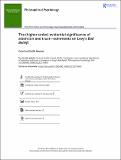The (higher-order) evidential significance of attention and trust—comments on Levy’s Bad Beliefs
Abstract
In Bad Beliefs, Levy presents a picture of belief-forming processes according to which, on most matters of significance, we defer to reliable sources by relying extensively on cultural and social cues. Levy conceptualizes the kind of evidence provided by socio-cultural environments as higher-order evidence. But his notion of higher-order evidence seems to differ from those available in the epistemological literature on higher-order evidence, and this calls for a reflection on how exactly social and cultural cues are/count as/provide higher-order evidence. In this paper, I draw on the three-tiered model of epistemic exchange that I have been developing recently, which highlights the centrality of relations of attention and trust in belief-forming processes, to explicate how social and cultural cues provide higher-order evidence. I also argue that Levy’s account fails to sufficiently address the issue of strategic actors who have incentives to pollute epistemic environments for their benefit, and more generally the power struggles, incentives, and competing interests that characterize human sociality. Levy’s attempted reduction of the political to the epistemic ultimately fails, but his account of social and cultural cues as higher-order evidence offers an insightful perspective on epistemic social structures.
Citation
Dutilh Novaes , C 2023 , ' The (higher-order) evidential significance of attention and trust—comments on Levy’s Bad Beliefs ' , Philosophical Psychology , vol. 36 , no. 4 , pp. 792-807 . https://doi.org/10.1080/09515089.2023.2174845
Publication
Philosophical Psychology
Status
Peer reviewed
ISSN
0951-5089Type
Journal item
Description
Funding: The work was supported by the H2020 European Research Council [ERC-2017-CoG 771074].Collections
Items in the St Andrews Research Repository are protected by copyright, with all rights reserved, unless otherwise indicated.

